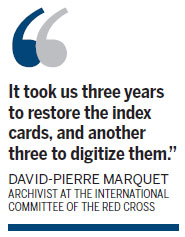Prisoner files from WWI offer online trove
Fate of 2 million captured or missing in war digitized by Red Cross branch
From Charles de Gaulle to the teenage son of Rudyard Kipling and forgotten names from across the globe, the story of millions captured or missing in World War I is now laid bare with a mouse click.
Marking a century after the start of the 1914-1918 war, the Red Cross has digitized its files documenting the fate of 2 million prisoners.
"It took us three years to restore the index cards, and another three to digitize them," said David-Pierre Marquet, archivist at the International Committee of the Red Cross.
The haul of files is searchable at icrc.org/ww1.
The originals, which were inscribed into UNESCO's Memory of the World Register in 2007, are stacked in tall glass cases filling an entire hall at the ICRC museum.
Based in neutral Switzerland, the ICRC created a special tracing division just two weeks after the war broke out. Hundreds of volunteers spent the war matching family inquiries, passed on by local Red Cross branches, with lists of POWs obtained from the warring parties.
"The ICRC would be able to reply that 'Your father's alive, he's in this particular camp', and they could send a Red Cross message to re-establish family ties," Marquet said.
The ICRC continues to play that role in the age of Skype.
ICRC staffers also visited POW camps worldwide, and their reports have likewise been digitized.
The Swiss government funded the $4.3-million digitization project.
"The ICRC was an intermediary, guaranteeing correspondence between prisoners and their families and verifying conditions of internment and captivity," ICRC historian Fabrizio Bensi said.
Most of the card file volunteers were women - Swiss men aged 20 to 50 had been called up to protect the borders. The volunteers produced alphabetical index cards with basics such as name, regiment, date and place of capture and site of detention.
Subfiles detailing tracing efforts and ICRC responses swelled the total number of cards to 6 million.
It was a mammoth task in the pre-computer era. "It was the first time that so much international information had been centralized," Marquet said.
A century on, history buffs are thrilled.
"What a wonderful gift to the descendants of the men of all countries who fought in World War I," said Jenni Dobson, a Briton who found details of her grandfather William Allen, then 24, who was captured in France in September 1916.
"I got a real buzz," she said.
The file confirmed the family story that Allen's parents received a letter from him saying he had been wounded and captured.
"The ICRC records show he was in a hospital. He recovered enough to survive his imprisonment and return home to marry and raise a family," said Dobson, who was 10 when her grandfather died in 1957.
The files include individuals who later won fame.
One shows details about future World War II French leader, and later president, Charles de Gaulle.
The 25-year-old captain was wounded and captured in 1916. He spent the rest of the war in a string of camps, despite multiple efforts to escape.

(China Daily 09/05/2014 page10)














